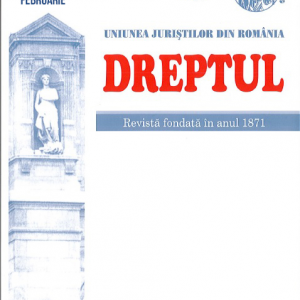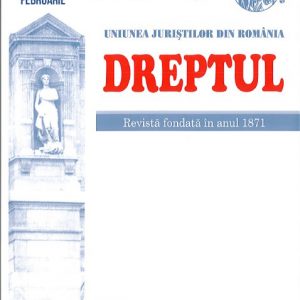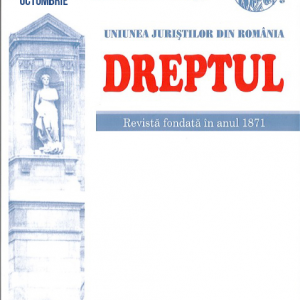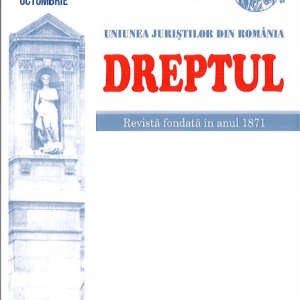-
 The ordinary courts have the general competence to protect the rights and freedoms of individuals, whether provided or not in the international treaties or in the Constitution of Romania. The Constitutional Court’s claim to be the only one to exercise constitutional justice powers is based on a faulty interpretation of its own competence, which is constitutionally determined as being to ensure the supremacy of the Constitution, and on reducing the constitutional contentious to the contentious of rules. A correct interpretation of the constitutional provisions and the fructification of the Romanian tradition in the matter of constitutional justice demonstrate that the ordinary courts are competent to apply the Constitution in order to protect the rights and freedoms of individuals, therefore to exercise constitutional justice powers, because this is not reduced to the control of the constitutionality of the laws.
The ordinary courts have the general competence to protect the rights and freedoms of individuals, whether provided or not in the international treaties or in the Constitution of Romania. The Constitutional Court’s claim to be the only one to exercise constitutional justice powers is based on a faulty interpretation of its own competence, which is constitutionally determined as being to ensure the supremacy of the Constitution, and on reducing the constitutional contentious to the contentious of rules. A correct interpretation of the constitutional provisions and the fructification of the Romanian tradition in the matter of constitutional justice demonstrate that the ordinary courts are competent to apply the Constitution in order to protect the rights and freedoms of individuals, therefore to exercise constitutional justice powers, because this is not reduced to the control of the constitutionality of the laws. -
 This study is an analysis of the conditions of admissibility by the procedure covered by Article 56 of the Law No 254/2013 of complaints made by the convicted persons in connection with the awarding of compensation days for inadequate conditions of accommodation and the cancellation of the wage garnishment, measure set up by the tax enforcement bodies in order to recover judicial expenses due to the state by those persons. I have chosen to analyse these two situations in the context in which the judge of surveillance of deprivation of liberty is increasingly faced with such complaints from private persons deprived of liberty claiming violation of rights as a result of the application of these two measures. For the presentation of legal problems and the situation I used national case law of judges of surveillance of deprivation of liberty, but also the national case law of the courts.
This study is an analysis of the conditions of admissibility by the procedure covered by Article 56 of the Law No 254/2013 of complaints made by the convicted persons in connection with the awarding of compensation days for inadequate conditions of accommodation and the cancellation of the wage garnishment, measure set up by the tax enforcement bodies in order to recover judicial expenses due to the state by those persons. I have chosen to analyse these two situations in the context in which the judge of surveillance of deprivation of liberty is increasingly faced with such complaints from private persons deprived of liberty claiming violation of rights as a result of the application of these two measures. For the presentation of legal problems and the situation I used national case law of judges of surveillance of deprivation of liberty, but also the national case law of the courts. -
 Dispozițiile art. 44 alin. (3) C.pr.pen. reglementează un caz de prorogare legală a competenței, în sensul că infracțiunea de favorizare a făptuitorului este de competența instanței care judecă infracțiunea la care aceasta se referă, competența materială a infracțiunii corelative fiind câștigată mai înainte și independent de reunirea cauzelor. În acest context, dacă judecătorul de cameră preliminară care funcționează la judecătorie, fiind sesizat prin rechizitoriu cu judecarea unei infracțiuni de favorizare a făptuitorului – făptuitorul favorizat fiind judecat de către tribunal – verifică și menține măsura preventivă luată în faza urmăririi penale, violează dispozițiile relative la competența materială a instanțelor de judecată prevăzute sub sancțiunea nulității absolute, potrivit art. 281 alin. (1) lit. b) C.pr.pen. (cu notă critică).
Dispozițiile art. 44 alin. (3) C.pr.pen. reglementează un caz de prorogare legală a competenței, în sensul că infracțiunea de favorizare a făptuitorului este de competența instanței care judecă infracțiunea la care aceasta se referă, competența materială a infracțiunii corelative fiind câștigată mai înainte și independent de reunirea cauzelor. În acest context, dacă judecătorul de cameră preliminară care funcționează la judecătorie, fiind sesizat prin rechizitoriu cu judecarea unei infracțiuni de favorizare a făptuitorului – făptuitorul favorizat fiind judecat de către tribunal – verifică și menține măsura preventivă luată în faza urmăririi penale, violează dispozițiile relative la competența materială a instanțelor de judecată prevăzute sub sancțiunea nulității absolute, potrivit art. 281 alin. (1) lit. b) C.pr.pen. (cu notă critică). -
 This article discusses the material and territorial jurisdiction for the settlement in the matter of land fund disputes. The material jurisdiction is examined in terms of art. 94 item 1. letter j), art. 94 items 3 and 4, Art. 95 item 1 of the Code of Civil Procedure and the special regulations contained in Law no. 18/1991, as republished, and the territorial jurisdiction of the perspective of art. 107 para. (1), art. 117 of the Code of Civil Procedure and the special law. The jurisdiction issue concerns the various actions on the land fund, arising from the enforcement of the Law no. 18/1991, as republished. The regulation of the jurisdiction of the actions settlement in the matter of the land fund, in favor of the same court, is proposed de lege ferenda.
This article discusses the material and territorial jurisdiction for the settlement in the matter of land fund disputes. The material jurisdiction is examined in terms of art. 94 item 1. letter j), art. 94 items 3 and 4, Art. 95 item 1 of the Code of Civil Procedure and the special regulations contained in Law no. 18/1991, as republished, and the territorial jurisdiction of the perspective of art. 107 para. (1), art. 117 of the Code of Civil Procedure and the special law. The jurisdiction issue concerns the various actions on the land fund, arising from the enforcement of the Law no. 18/1991, as republished. The regulation of the jurisdiction of the actions settlement in the matter of the land fund, in favor of the same court, is proposed de lege ferenda. -
 The article analyzes the jurisdiction of the Romanian court to settle the divorce application in case of spouses, Romanian citizens, who do no longer reside on the Romanian territory. The problems are analyzed in relation to the Community regulations directly applicable in the Member States of the European Union, as well as to the provisions of the Civil Procedure Code in this matter.
The article analyzes the jurisdiction of the Romanian court to settle the divorce application in case of spouses, Romanian citizens, who do no longer reside on the Romanian territory. The problems are analyzed in relation to the Community regulations directly applicable in the Member States of the European Union, as well as to the provisions of the Civil Procedure Code in this matter. -
 According to the Labor Code (Law no. 53/2003, republished on the 18 of May 2011), the employer, under the pain of absolute nullity, cannot inflict any disciplinary sanction (except the written warning), without beforehand and compulsorily, performing a disciplinary investigation as well, by an individual authorized by the employer to this end. The minimum rules regarding the disciplinary procedure (namely, also those regarding the prior disciplinary investigation) are set forth in the Labor Code and are developed by the Internal Regulations of the unit. Such being the case, this kind of rules cannot be legally established in the collective employment agreement, no matter its level of negotiation (at the level of the unit, of the group of units or of the fields of activity), even if during the period 2007–2010 the national unique Collective Employment Agreement (terminated at present) regulated, against the law, a procedure regarding the (prior and compulsory) disciplinary investigation which included also provisions obviously contrary to the Labor Code.
According to the Labor Code (Law no. 53/2003, republished on the 18 of May 2011), the employer, under the pain of absolute nullity, cannot inflict any disciplinary sanction (except the written warning), without beforehand and compulsorily, performing a disciplinary investigation as well, by an individual authorized by the employer to this end. The minimum rules regarding the disciplinary procedure (namely, also those regarding the prior disciplinary investigation) are set forth in the Labor Code and are developed by the Internal Regulations of the unit. Such being the case, this kind of rules cannot be legally established in the collective employment agreement, no matter its level of negotiation (at the level of the unit, of the group of units or of the fields of activity), even if during the period 2007–2010 the national unique Collective Employment Agreement (terminated at present) regulated, against the law, a procedure regarding the (prior and compulsory) disciplinary investigation which included also provisions obviously contrary to the Labor Code. -

-
 International agreements constitute a category of legal acts within the European Union (EU). They are concluded by the EU acting alone or jointly with Member States depending on the provisions of the founding Treaties. With the entry into force of the Treaty of Lisbon, the European Union (EU) acquired legal personality. It is therefore a subject of international law which is capable of negotiating and concluding international agreements on its own behalf. The external competences of the EU are defined in Article 216 of the Treaty on the Functioning of the EU. The division of competences between the EU and Member States is also expressed at international level. The current division of competences between the EU and Member States is not set in stone. However, the reduction or extension of EU competences is a delicate matter which requires the consent of all Member States and necessitates a revision of the Treaties.
International agreements constitute a category of legal acts within the European Union (EU). They are concluded by the EU acting alone or jointly with Member States depending on the provisions of the founding Treaties. With the entry into force of the Treaty of Lisbon, the European Union (EU) acquired legal personality. It is therefore a subject of international law which is capable of negotiating and concluding international agreements on its own behalf. The external competences of the EU are defined in Article 216 of the Treaty on the Functioning of the EU. The division of competences between the EU and Member States is also expressed at international level. The current division of competences between the EU and Member States is not set in stone. However, the reduction or extension of EU competences is a delicate matter which requires the consent of all Member States and necessitates a revision of the Treaties. -
 Potrivit art. 48 alin. (1) C.pen., complice este persoana care, cu intenție, înlesnește sau ajută în orice mod la săvârșirea unei fapte prevăzute de legea penală. Conform art. 174 C.pen., prin săvârșirea unei infracțiuni sau comiterea unei infracțiuni se înțelege săvârșirea oricăreia dintre faptele pe care legea le pedepsește ca infracțiune consumată sau ca tentativă, precum și participarea la comiterea acestora în calitate de coautor, instigator sau complice.
Potrivit art. 48 alin. (1) C.pen., complice este persoana care, cu intenție, înlesnește sau ajută în orice mod la săvârșirea unei fapte prevăzute de legea penală. Conform art. 174 C.pen., prin săvârșirea unei infracțiuni sau comiterea unei infracțiuni se înțelege săvârșirea oricăreia dintre faptele pe care legea le pedepsește ca infracțiune consumată sau ca tentativă, precum și participarea la comiterea acestora în calitate de coautor, instigator sau complice. -
 This study appeared as a result of a case solved in practice and identifies legal issues also common to many other cases, which, as always, is subject to the analysis and to the specialised criticism, the latter being accompanied by any other possible points of view.
This study appeared as a result of a case solved in practice and identifies legal issues also common to many other cases, which, as always, is subject to the analysis and to the specialised criticism, the latter being accompanied by any other possible points of view. -
 After the entry into force of Article 1541 of the Civil Procedure Code, the judgments will have a different communication regime as compared to the other procedural documents. More precisely, if the party indicates the appropriate data in order to communicate the procedural documents by e-mail, the court will have the obligation to communicate the judgment to the party by e-mail, in accordance with the provisions of Article 1541 (1) of the Civil Procedure Code, however, it will not be obliged to communicate the summons or the other procedural documents to the respective party by e-mail, since with regard to these procedural documents remain applicable the provisions of Article 154 (6) of the Civil Procedure Code, which regulates only the possibility of the court to communicate these procedural documents by e-mail, and not the obligation of the court to proceed in this way. Therefore, we note the existence of an asymmetry, with regard to the communication regime, between the judgment and the other procedural documents, which is why we believe that the legislator should intervene in order to standardize the communication regime of all procedural documents, there being no reason why the respective communication of procedural documents should be carried out differently.
After the entry into force of Article 1541 of the Civil Procedure Code, the judgments will have a different communication regime as compared to the other procedural documents. More precisely, if the party indicates the appropriate data in order to communicate the procedural documents by e-mail, the court will have the obligation to communicate the judgment to the party by e-mail, in accordance with the provisions of Article 1541 (1) of the Civil Procedure Code, however, it will not be obliged to communicate the summons or the other procedural documents to the respective party by e-mail, since with regard to these procedural documents remain applicable the provisions of Article 154 (6) of the Civil Procedure Code, which regulates only the possibility of the court to communicate these procedural documents by e-mail, and not the obligation of the court to proceed in this way. Therefore, we note the existence of an asymmetry, with regard to the communication regime, between the judgment and the other procedural documents, which is why we believe that the legislator should intervene in order to standardize the communication regime of all procedural documents, there being no reason why the respective communication of procedural documents should be carried out differently. -
 In this study, after a presentation regarding the establishment of the Commonwealth of Independent States (C.I.S.), in December 1991, the author examines: the legal personality of this international organization; its constituent bodies; the member states of the organization; CIS – present and prospects.
In this study, after a presentation regarding the establishment of the Commonwealth of Independent States (C.I.S.), in December 1991, the author examines: the legal personality of this international organization; its constituent bodies; the member states of the organization; CIS – present and prospects.
